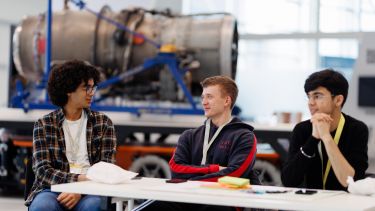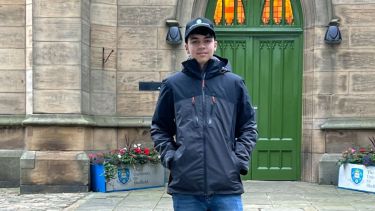My name is Himanshu Kriplani, I am an international student from India and a first year BEng Electrical and Electronic Engineering student. I am very passionate about my course, and am particularly interested in power electronics as a core field.
To get the most out of University I have taken part in a lot of extra curricular activities which includes two student-led projects which are UKSEDS National Rocketry Competition under Sheffield Space Initiative Society, and Project Sunsat. I am also an EEE Department Ambassador and a first year student representative. Recently, I also got elected as the Project Manager for the wind turbine project under Engineers Without Borders Society. I am a very enthusiastic person who is excited for opportunities I may come across in the future. For me, my experiences taking part in hackathons helps to inform and inspire my learning and preparation for a future career.
In March, I took part in two separate hackathons - my team received a runners up prize in one of the competitions, and won the other! Read about the two experiences below:
Advanced Manufacturing Research Centre (AMRC) Next Generation Hackathon
The event started with breakfast and tea at the factory which was a wonderful opportunity to network with people and make new friends through talking about their course and their experiences.
After the breakfast, we had an introduction to the hackathon as well as an ice breaker session in which we were divided into groups, where we came up with a business idea. This session helped boost our creative mindsets ahead of the hackathon.
The AMRC team then introduced the tasks we’d be working on. The hackathon was based on a task analysing the data generated by a machine in the factory - our challenge was to convert the format of the data to a different format, and to then visualise the data and present it in a presentation at the end of the competition.
We immediately started working on the data provided, and then the coding began! When our data graphs were ready we made our presentation, which got the runners up prize.
Personally, I found this to be an excellent experience, and it was also my first time taking part in a hackathon. I feel it was definitely worth it, as I got to see the factory and got an opportunity to work on a real life situation in a team and solve a machine data analysis problem. It was a fun activity to do as I got to meet new people from different departments, and the constant flow of food and drinks was icing on the cake!
As a result of taking part in the AMRC hackathon, I decided in future hackathons that I would work more on my programming skills so that I could contribute more to my team in this area. For an electrical and electronic engineering student this challenge was a very different sector and activity to work on, but I learnt a lot. At the start being the only student in the hackathon that didn’t come from a computer science background I felt a bit scared, but with time and learning that came from working in a team of data scientists my confidence was definitely boosted. Getting runners up was a further confidence boost for me, encouraging me to take part in more hackathons in the future, and urging me to find areas I can develop in to further my contributions in the team.
Read more about this hackathon on the AMRC's website
Engineers without Borders Hackathon
This hackathon was organised by the University of Sheffield Engineers Without Borders Society, and was held on Sunday 26th of March in The Diamond building on campus.
The event started with a small introduction to the work that the society does, but after this (as the teams were already assigned) the hackathon started right away after participants were given information about the task that needed to be done in order to win.
This hackathon revolved around finding an engineering solution for a situation in a refugee camp in Mozambique. The camp has mostly temporary housing, and a recent cyclone has ripped apart most of the houses there and shattered the infrastructure of the region. It has also led to problems with transportation, creating issues with access to food, water and eventually compromising the health of residents. Other problems included access to education, employment, and economic and corruption-related difficulties.
The task for teams was to come up with an engineering solution to deal with the problem. After a long discussion with the team, we settled on the idea of building and designing a house structure from scratch which could solve a lot of problems with living space and employment, and could eventually generate money for education involving more local people to reduce corruption. We decided it was crucial to use local supplies to create the houses to reduce building costs, but the structure needed to be strong enough to fight the cyclone winds every year, and it needed to incorporate water storage to fight the drought season.
Personally, after the first hackathon I had more confidence when approaching this one. However, this hackathon was a completely different experience as it was more based on engineering real life solutions and involved thinking around business, finance and politics as well. It was very fun to work in an interdisciplinary team made up of people from different backgrounds including civil engineers, structural engineers and mechanical engineers. This time I was able to contribute more than the previous time, as I had more confidence and experience. I was focused on the best solution, and tried not to miss or skip over any points that were key considerations. Winning this hackathon was again a confidence boost for me, and made all the hard work over the day worth it. Each member of our team also won a £20 gift card to reward our efforts. I look forward to more opportunities to take part in hackathons such as this one in the future.



